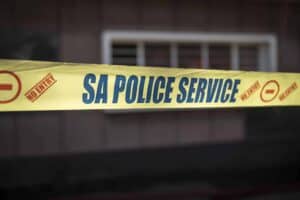Police officers could face “disciplinary steps” should they not comply with the new directive to no longer arrest people for personal use of cannabis.

Although the personal use of cannabis was decriminalised in 2018, some South Africans are still fearful of being arrested by the police.
Speaking to The Citizen on condition of staying anonymous, a person who grows cannabis for their personal use said, “I am most definitely still scared of the police when growing [marijuana]. Especially, with the continuation of raids on innocent growers after decriminalisation. The grey areas around cannabis leaves space for corrupt police officials to get away with illegal confiscation/robbery.
“I don’t fear having weed on my person as the law is on our side but I do fear being confronted by a corrupt police officer.”
Police directive over cannabis use
This, however, could change after the South African Police Services (Saps) issued a directive on 23 August 2023 instructing police members that they can no longer arrest people for personal cultivation and/or possession of cannabis.
National police spokesperson Colonel Athlenda Mathe confirmed to The Citizen on Tuesday that the directive is authentic.
ALSO READ: ‘It will create a police state’: Dagga Party calls cannabis bill ‘fascist’
Richard Chemaly, a high court lawyer, told The Citizen that given parliament’s previous reluctance to act on the arrests of people using cannabis, this is the most proactive move by the state since the 2018 Constitutional Court (ConCourt) case decriminalising personal usage.
“I’m not sure what specifically inspired the directive but it’s certainly welcome and overdue. It adds a degree of certainty in a cannabis industry left confused by the various ways to interpret the judgment. We’ve never had clear legal position on the extent of the notion of private use,” he said.
Chemaly, however, cautions South Africans to be wary before they light a joint.
“The public must, however, be warned that the directive is not hard law and remains an internal document. The police have taken a position and that just gives us a better idea of when they will or won’t make arrests.”
He believes it is likely that this has been done because the confusion around the law caused different police stations to act differently, and as cannabis communities grow, they’re beginning to notice the mismatched treatment.
Confusion over ConCourt ruling
Since the ConCourt ruling in 2018, there has been much confusion regarding the legal position relating to the cultivation and possession of cannabis. This judgment has become known as Prince 3.
However, the ConCourt did not confirm the decriminalisation of dealing in cannabis.
This means that until Parliament changes legislation, dealing in cannabis, as defined by the Drugs and Trafficking Act, is still not permitted.
This includes performing any act in connection with the transshipment, importation, cultivation (other than the cultivation of cannabis by an adult in a private space for personal use), collection, manufacture, supply, prescription, administration, sale, transmission or exportation of the drug.
ALSO READ: Durban has the most dope: SA’s top home-growers revealed
The Saps directive states: “There is currently no legislation that prescribes what quantities of cannabis may be possessed or cultivated in order to comply with the Prince judgment.
“There is also no legislation that allows for a presumption of dealing where cannabis quantities above a certain threshold is found in the possession of a person.”
Because of no definition or quantification of the concept of personal and private consumption, Saps is at risk of civil claims for unlawful arrest or detention if they arrest a person for possession, use or cultivation of cannabis.
“Before arresting alleged cannabis offenders and the seizure of their property proceed, members of the Saps should liaise with the prosecuting authority, where possible, to determine whether the matter will be enrolled and prosecuted,” the letter stated.
Defining a private space, the directive states that a private space is any space that the public does not have access to as a matter of right.
ALSO READ: You can’t legalise cannabis for private use and criminalise selling it, says farming group
Examples include a person not needing to be the owner of a space for it to be their private space, and the inside of a motor vehicle is a private space. Additionally, cannabis dispensed by a traditional, cultural or religious healer in small quantities is considered to be private and personal possession.
The document states that all Saps members have to familiarise themselves with the contents of the directive. “Failure of a member to comply with these instructions may result in disciplinary steps.”
“No arrests are to be made for personal and private cultivation and/or possession of cannabis, which activities are not criminal. Furthermore, no arrests of alleged cannabis offenders should be effected merely for the reason to achieve pr-determined targets and without assurance that there is indeed a crime that with be enrolled and prosecuted by the National Prosecuting Authority, ” reads the directive.
- Additional reporting by GroundUp






